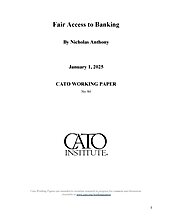The approach in the Fair Access to Banking Act would be a misguided reaction to the U.S. government pressuring banks and other financial institutions to close customer accounts. Rather than respond to the government’s role in this saga, the bill would instead target financial institutions. This approach fails to confront the root cause of the problem—governments increasingly using financial systems as tools of political influence and control.
As the world delves deeper into the digital age, governments have increasingly recognized that financial activity can be targeted to undermine political movements, shut down rivals, and circumvent traditional constraints. This phenomenon can be seen abroad where anti-money laundering laws have been used to go after political rivals and seen here in the United States where vague regulations have been used to shut down politically disfavored businesses.
Nowhere was this reality more evident in the United States than the experience under Operation Choke Point—an Obama administration initiative to choke off businesses from access to financial services. While many people believed this practice ended during the first Trump administration, concerns about debanking reemerged under the Biden administration. Reports have shown that people affiliated with the cryptocurrency industry, religious groups, and others have had their financial accounts suddenly shut down with little to no explanation. A common thread during this experience has been that banks have repeatedly told these customers they are not allowed to explain the decision.
To address these concerns, some members of Congress have proposed the Fair Access to Banking Act as a possible solution. However, the methods prescribed in the Fair Access to Banking Act are troubling. In the worst case, the bill responds to government pressure on financial institutions by further restricting what those institutions are allowed to do. A better approach is to instead target the main source of the problem: misguided laws and regulations that allow the government to pressure these businesses in the first place. Congress should help expose how widespread debanking has become and cut out the tools that the government has used to pressure banks and other financial institutions.

